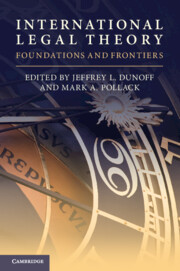Book contents
- International Legal Theory
- Reviews
- International Legal Theory
- Copyright page
- Contents
- Contributors
- Acknowledgments
- Part I Introduction: Setting the Stage
- Part II Traditional Approaches to International Law
- 2 Natural Law: Current Contributions of the Natural Law Tradition to International Law
- 3 International Legal Positivism
- 4 Legal Realism and International Law
- 5 Transnational Legal Process and the “New” New Haven School of International Law
- Part III Critical Approaches to International Law
- Part IV Post–Cold War Approaches to International Law
- Part V Interdisciplinary Approaches to International Law
- Part VI International Law: Dialogue and Dialectic
- Index
5 - Transnational Legal Process and the “New” New Haven School of International Law
from Part II - Traditional Approaches to International Law
Published online by Cambridge University Press: 21 July 2022
- International Legal Theory
- Reviews
- International Legal Theory
- Copyright page
- Contents
- Contributors
- Acknowledgments
- Part I Introduction: Setting the Stage
- Part II Traditional Approaches to International Law
- 2 Natural Law: Current Contributions of the Natural Law Tradition to International Law
- 3 International Legal Positivism
- 4 Legal Realism and International Law
- 5 Transnational Legal Process and the “New” New Haven School of International Law
- Part III Critical Approaches to International Law
- Part IV Post–Cold War Approaches to International Law
- Part V Interdisciplinary Approaches to International Law
- Part VI International Law: Dialogue and Dialectic
- Index
Summary
This chapter reviews the Transnational Legal Process approach to international law, sometimes called the “‘New’ New Haven School of International Law.” The term “School” is used here advisedly, to refer to a school of thought, belief, learning, or scholarship, often named after its place of origin, that comprises like-minded individuals who share common opinion, outlook, philosophy, or membership in the same intellectual, artistic, social, or cultural movement. Like its predecessor – the New Haven School of International Law, which arose after World War II – the Transnational Legal Process, or “New” New Haven, School of International Law of the late twentieth century traces its intellectual roots to Yale Law School in New Haven, Connecticut, historically the foremost training ground for legal academics in the United States.
But like most intellectual schools, neither school of international legal theory rooted in New Haven included all international lawyers who lived in New Haven, nor did all of the schools’ members reside there.
- Type
- Chapter
- Information
- International Legal TheoryFoundations and Frontiers, pp. 101 - 130Publisher: Cambridge University PressPrint publication year: 2022
- 1
- Cited by

